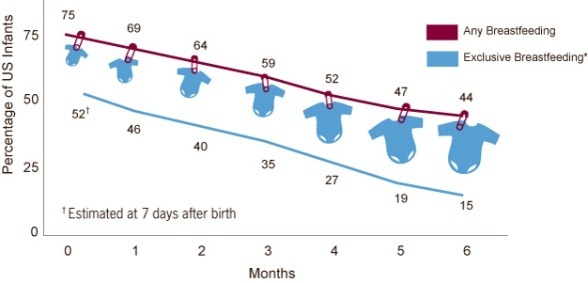According to a report by the U.S. Centers for Disease Control and Prevention (CDC), hospitals are not doing enough to encourage breastfeeding among new mothers.
According to CDC director Dr. Thomas Frieden improvements may require “large cultural changes within hospitals,” noting that many routinely give formula to all infants. He added that some formula companies provide hospitals with the supplies they need for preemies and other special needs infants who cannot breastfeed at no charge as long as the hospitals put samples of formula in the goody bags they send home with new mothers. Hospitals worry that changing this practice would cost them money, Frieden said, but, he countered, promoting breastfeeding will in the long run reduce costs because it will lower the burden of illness in these children. 
He explained that a feature that fosters breastfeeding is “rooming in,” where infants stay with their mothers 24 hours a day rather than in a nursery. A practice that has “been in existence for decades,” Frieden explained. Yet, just a third of hospitals keep baby at mom's bedside, according to the report.
More than 80 percent of hospitals also work against nursing by supplementing breastfed infants with formula when not medically necessary, which the CDC said, “makes it harder for mothers and babies to learn how to breastfeed and continue breastfeeding at home.”
The report is part of a wide-ranging government initiative to promote breastfeeding, which research has consistently shown improves outcomes for both mother and child. Breastfed infants have a lower risk of obesity, diabetes, sudden infant death syndrome, and a host of infectious diseases, and their mothers have a lower risk of breast and ovarian cancer, among other benefits.
Currently, only 15 percent of mothers breastfeed exclusively for six months, and just 44 percent are still breastfeeding at all after that time, Frieden said. He said just 4% of hospitals have adopted at least nine of the 10 principles spelled out in the Baby-Friendly Hospital Initiative sponsored by the World Health Organization and UNICEF and 9 percent have adopted no more than two.
The 10 principles include helping mothers begin breastfeeding within an hour of birth and encouraging community support of breastfeeding, in addition to having a written policy, “rooming in,” and banning supplementary feedings that are not medically necessary.
Only three - Boston Medical Center, Cambridge Birth Center, and Tobey Hospital - are designated as Baby-Friendly. About 85 percent of new mothers leaving Boston Medical Center are breastfeeding when they’re discharged compared with 68 percent of those discharged from Bay State Medical Center and 63 percent of those leaving Good Samaritan Medical Center in Brockton. All three serve low-income populations with traditionally lower rates of breastfeeding.
The report finds that only around half of hospitals help mothers initiate breastfeeding within the first hour after birth. And only a quarter give mothers breastfeeding support - such as a follow-up visit, a phone call, or referrals to lactation consultants - after they leave the hospital. Frieden said that a previous CDC study found that the more WHO/UNICEF criteria a hospital met, the more likely it was that a woman would still be breastfeeding two months later.
He noted, too, that low rates of breastfeeding add $2.2 billion a year to medical costs, which is based solely on healthcare costs and doesn't include lost productivity or other costs. At current trends it would take 100 years before every U.S. hospital would be up-to-speed with the recommendations he said.
Data in the Vital Signs report come from the CDC's National Survey of Maternity Practices in Infant Nutrition and Care. The report comes a day after the announcement of new federal guidelines that mandates insurance companies provide free breast pumps and lactation support to nursing mothers after they leave the hospital.
Massachusetts does a little better than the national average for its percentage of nursing mothers: In 2007, nearly 78 percent of new mothers left the hospital intending to breastfeed, compared with the US average of 75 percent. By six months, half of Massachusetts mothers were still breastfeeding compared with 43 percent for the national average. “We are making efforts, we are making strides,” said Dr. Lauren Smith, medical director of the state Department of Public Health in describing the latest state data from 2009, which found that 82 percent of mothers left the hospital intending to nurse - the highest percentage ever reported in the state.